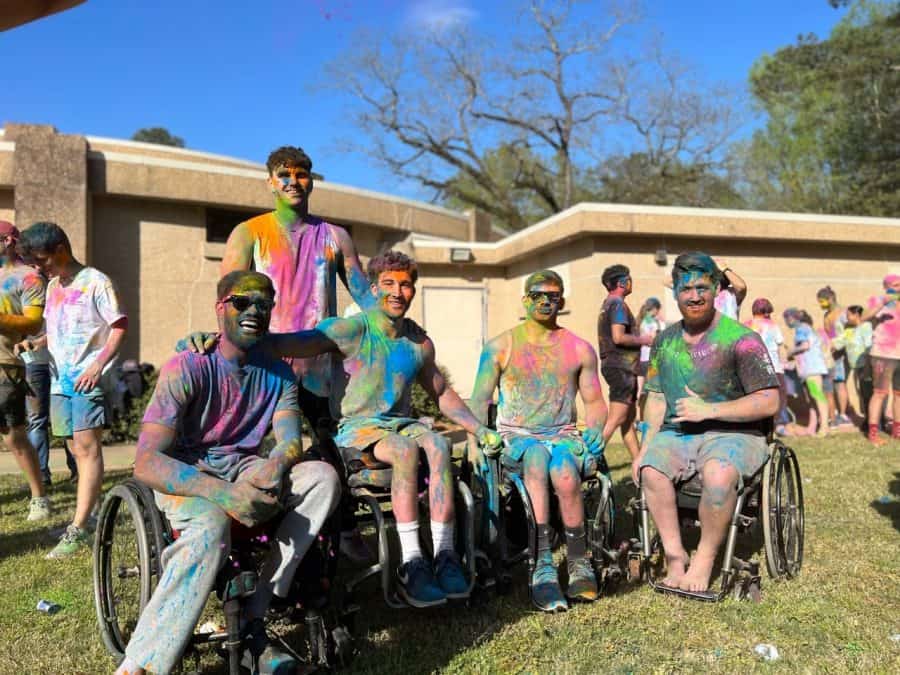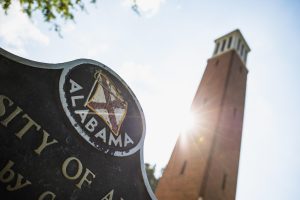How diversity and inclusivity groups combat injustice at UA
Courtesy of The Indian Students Association of Tuscaloosa
The Indian Students Association of Tuscaloosa at an annual event open to the community of Tuscaloosa.
February 2, 2023
As The University of Alabama grows, striving for diversity and inclusion amongst student organizations is essential to promoting a welcoming environment for all students and fighting for injustice on campus. In a school with a population over 70% white, starting a student organization can be one of the first steps for a minority group to create community and stand up for its own interests.
Over 70 student organizations focus on emphasizing diversity and inclusion, and they are taking action and creating events to fight injustice on campus and beyond. The Bama Indigenous Student Organization Network, the Indian Students Association of Tuscaloosa and the African Students Association are just a few student groups who are doing their part to inspire understanding and encourage diversity on campus.
BAMA INDIGENOUS STUDENT ORGANIZATION NETWORK
Kiana Younker, a senior majoring in dance, is the co-president and co-founder of the Bama Indigenous Student Organization Network.
After a professor connected Younker with Katherine Johnston, another indigenous student on campus, the two became friends and began to collaborate on the concept for their organization.
“For the first two-and-a-half years of our undergrad, we were told that there were no other indigenous people on campus besides ourselves,” Younker said.
According to the UA Office of Institutional Research and Assessment, there were 108 full-time students enrolled in the fall 2022 semester who identify as being American Indian or Alaska Native.
The two established BISON to create awareness and connect with other indigenous students at the University. Younker said they hope to rewrite the historical and contemporary narrative of indigenous people on campus and in society. They currently have 40 active members and are continuing to grow.
“The fact of the matter is a lot of people don’t know that indigenous people are still alive,” Younker said. “If you don’t think that my race exists then you also think my issues don’t exist, and that is super discouraging in any environment.”
According to a study conducted in 2018, 40% of Americans don’t believe that Native Americans still exist. More recently, it was found that “87% of American schools don’t teach about Native Americans past 1900.”
BISON strives to create a presence on campus in hopes that it will inspire the University to pay more attention to its demographic and do outreach to get more indigenous students on campus.
“BISON is a resource for information, but it is also up to the individual to enlighten yourself, and that’s what higher education is for,” Younker said.
While the organization is new to campus, it is already impacting students in meaningful ways. Cary Robinson, a junior majoring in history and communications, joined BISON because of her interest in history and Native American culture. She is now the treasurer and secretary of the organization.
“This position has really helped me understand the pain that other cultures and people have gone through that I didn’t even know existed,” Robinson said. “It’s been such an eye-opening experience.”
INDIAN STUDENTS ASSOCIATION OF TUSCALOOSA
The Indian Students Association of Tuscaloosa is another organization that has helped students find their own community on campus. A large and active organization, ISAT aims to make Indian students feel at home and to share the culture and traditions of India.
Aditya Upreti, a doctoral candidate studying physics, joined the club when he first came to the University a few years ago and is now the president of the association.
“It’s very important that all these student groups and different cultures are represented in the UA campus because it brings a sense of closeness among people,” Upreti said.
He said diversity on college campuses encourages people to learn about the unique cultures of its citizens and people from around the world. Additionally, it actively fights injustice by helping others be more accepting and respectful of others.
“The United States is a very big country with so many different cultures and people,” Upreti said. “Having diversity in these student groups is very important because it brings a lot to the institution.”
Sandhiya Thiagarajan, a doctoral candidate studying chemical and bioengineering, is the vice president of the association. She said their main goal is to promote exchanges of culture so that students feel accepted and understood.
“There should always be a diverse environment, where everybody is given a chance to represent their ideas and their views,” Thiagarajan said.
The association is also open to Indian families in the Tuscaloosa community and anyone else who wants to get involved. Within the past few years, the club has seen a lot of growth and many families attend their events such as Bollywood nights and Diwali.
Both Upreti and Thiagarajan said they have enjoyed their experiences at the University and like being a part of ISAT because it makes them feel more at home, strengthens their leadership skills and allows them to meet many new people.
AFRICAN STUDENTS ASSOCIATION
The African Students Association is an active group on campus that welcomes international students as well as people interested in African culture.
The ASA’s mission states that they support involvement on the University’s campus and foster unity amongst students regardless of race, ethnicity or religious orientation.
Sunday Okafor, a doctoral candidate studying civil engineering, joined when he came to the Capstone in 2021 and is now the president of the organization.
“The primary aim of the association is to create a community for international students from Africa and also to create an avenue for other people to interact with and learn more about the culture and heritage,” Okafor said.
ASA hosts many activities and events throughout the year that expose the UA and Tuscaloosa communities to African food, traditions and heritage, in the hopes that attendees will gain a new understanding and respect for their culture.
Okafor said the organization also helps international students from Africa feel more at home and makes them feel welcomed at the University.
“When we have diversity within the University it helps us to learn from each other, know the cultural differences we have, and helps us to know how to integrate better and to live a better and more inclusive life,” Okafor said.
ASA combats injustice on campus by partnering with the University’s Office of Diversity, Equity and Inclusion, the International Student and Scholar Services and with other organizations that advocate for diversity and the voices of minority students.
Coming to Alabama from Nigeria and working for the ASA has enabled Okafor to meet new people and develop personally by teaching him valuable life skills.
“It takes patience and emotional intelligence because you have people of different backgrounds and orientations,” Okafor said. “You want to learn how to show empathy and understand how to deal with different types of people.”
He said the organization has grown by over 50% within the past year and has become a resource for international students adjusting to the University, while engaging other students on campus through social activities. Currently, there are 161 international students at the University from Africa.
The BISON, ISAT and ASA are just a few organizations that promote diversity and inclusion so all students can feel safe and at home on campus. While increasing diversity at the University may seem small, these steps will hopefully enact social justice and spark positive change not only within institutions of higher education, but also beyond these institutions.





















